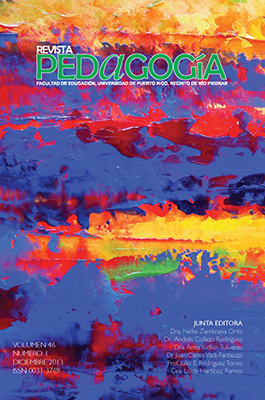Abstract
Video and computer games are a part of the upbringing of contemporary students, and a growing academic literature attests to their educational potential. Based on three University of Puerto Rico student teachers‘ use of video games in their practicum experiences in History at the UPR High School, ninth grade students answered a questionnaire and participated in focus groups. Analysis of these data reveals video games‘ limitations and possibilities as pedagogical resources. The time investment required to integrate two particular games into the curriculum, together with ethical issues involving violent content, were weighed against the curricular benefits of each use. Further study of these resources is called for, since research into this type of innovation may impact institutional openness to similar future curricular innovations.
How to cite:
Seale-Collazo, J. (2013). ¿Violencia virtual en el salón? Los videojuegos y la pedagogía lúdica como recursos para la enseñanza de la Historia a nivel secundario. Pedagogía, 46(1), 40-65. Retrieved from https://revistas.upr.edu/index.php/educacion/article/view/16415
References
Bloor, M., Frankland, J., Thomas, M. y Robson, K. (2001). Focus groups in social research. Thousand Oaks, CA: Sage Publications.
Clark, R. (2010). Assassin‘s Creed 2 shot through the heart. Christ and Pop Culture [website]. Recuperado de http://www.christandpopculture.com/featured/assassins-creed-2-shot-through-the-heart/
Editors. (2010). Cave painting: Video games as art. N+1, 10. Recuperado de http://nplusonemag.com/cave-painting
Entertainment Software Association. (2011). Games: Improving help. Recuperado de http://www.theesa.com/gamesindailylife/health.asp
Gee, J. P. (2007). What video games have to teach us about learning and literacy (2da. ed.). Nueva York: Palgrave MacMillan.
Hartmann, T. & Klimmt, C. (2006). Gender and computer games: Exploring females‘ dislikes. Journal of Computer-Mediated
Communication, 11(4), 910-931. Recuperado de http://jcmc.indiana.edu/vol11/issue4/hartmann.html
Kitzinger, J. (1995). Qualitative research: Introducing focus groups. British Medical Journal, 311, 299-302.
Klopfer, S., Osterweil, S., Groff, J. & Haas, J (2009). Using the technology of today, in the classroom today: The instructional power of digital games-social networking-simulations and how teachers can leverage them. The Education Arcade. Recuperado de http://education.mit.edu/papers/GamesSimsSocNets_EdArcade.pdf
Krueger, R. A. & Casey, M. A. (2008). Focus groups: A practical guide for applied research (3ra. ed.). Thousand Oaks, CA: Sage Publications.
Lucca, N. & Berríos, R. (2009). Investigación cualitativa: fundamentos, diseño y estrategia (2da. ed.). Cataño: Ediciones SM.
Prensky, M. (2001). Digital natives, digital immigrants. On the Horizon, 9(5), 1-6.
Quijano, J. (2008). Interactive narrative in the form of new media: Defining role playing games. Pedagogía, 41, 61-72.
Rosario Luna, R. (sin fecha). Poder: revolución burguesa; revolución socialista; liberación nacional; crisis capitalista. Juego de cartas preparado para uso educativo.
Shaw, P. (2009). Assassin‘s Creed 2: Blending fiction with history. Recuperado de http://www.gamepro.com/article/features/212767/assassins-creed-2-blending-fiction-with-history
Spindler, G. & Spindler, L. (1988). Roger Harker and Schonhausen: From familiar to strange and back again. En G. Spindler (ed.), Doing the ethnography of schooling: Educational anthropology in action. Prospect Heights, IL: Waveland Press.
Squire, K. (2003). Video games in education. International Journal of Intelligent Simulations and Gaming, 2(1), 49-62.
Squire, K. (2005). Changing the game: What happens when video games enter the classroom? Innovate: Journal of Online Education, 1(6).
Squire, K. (2007, Sep.-Oct.). Games, learning and society: Building a field. Educational Technology, pp. 51-54.
Squire, K. (2008). Video game-based learning: An emerging paradigm for instruction. Performance Improvement Quarterly, 21(2), 7-36.
Squire, K. & Barab, S. (2004). Replaying history: Engaging urban underserved students in learning world history through computer simulation games. Proceedings of the 6th International Conference on Learning Sciences (ICLS ‘04), Santa Mónica, CA.
Teachers Curriculum Institute. (1994). History Alive! Engaging all learners in the diverse classroom. Menlo Park, CA: Addison Wesley.
Webb, M. (2009, 3 de noviembre). Morgan Webb interviews Assassin‘s Creed II producer on historical Accuracy [vídeo]. Recuperado de http://www.g4tv.com/thefeed/blog/post/700421/morgan-webbinterviews-assassins-creed-ii-producer-on-historical-accuracy/

This work is licensed under a Creative Commons Attribution-NonCommercial 4.0 International License.

